University Critical Thinking Essay: Decision-Making and Leadership
VerifiedAdded on 2022/11/24
|11
|2870
|300
Essay
AI Summary
This essay delves into the core concepts of critical thinking, including self-awareness, inductive and deductive reasoning, information literacy, and argumentation, as applied within a leadership context. It examines the significance of these concepts in enhancing decision-making capabilities and outlines how these theories and models influence practical life, supported by personal reflections and self-assessments. The author highlights the importance of information literacy, self-assessment tools like the Johari Window, and a blended approach to decision-making. The essay further discusses future applications of these skills in a managerial role, emphasizing the importance of rational decision-making, effective communication, and the continuous improvement of critical thinking habits for professional growth. The essay concludes with a focus on the interplay of various theories and models, such as Prospect Theory, and their impact on decision-making within an organizational framework.
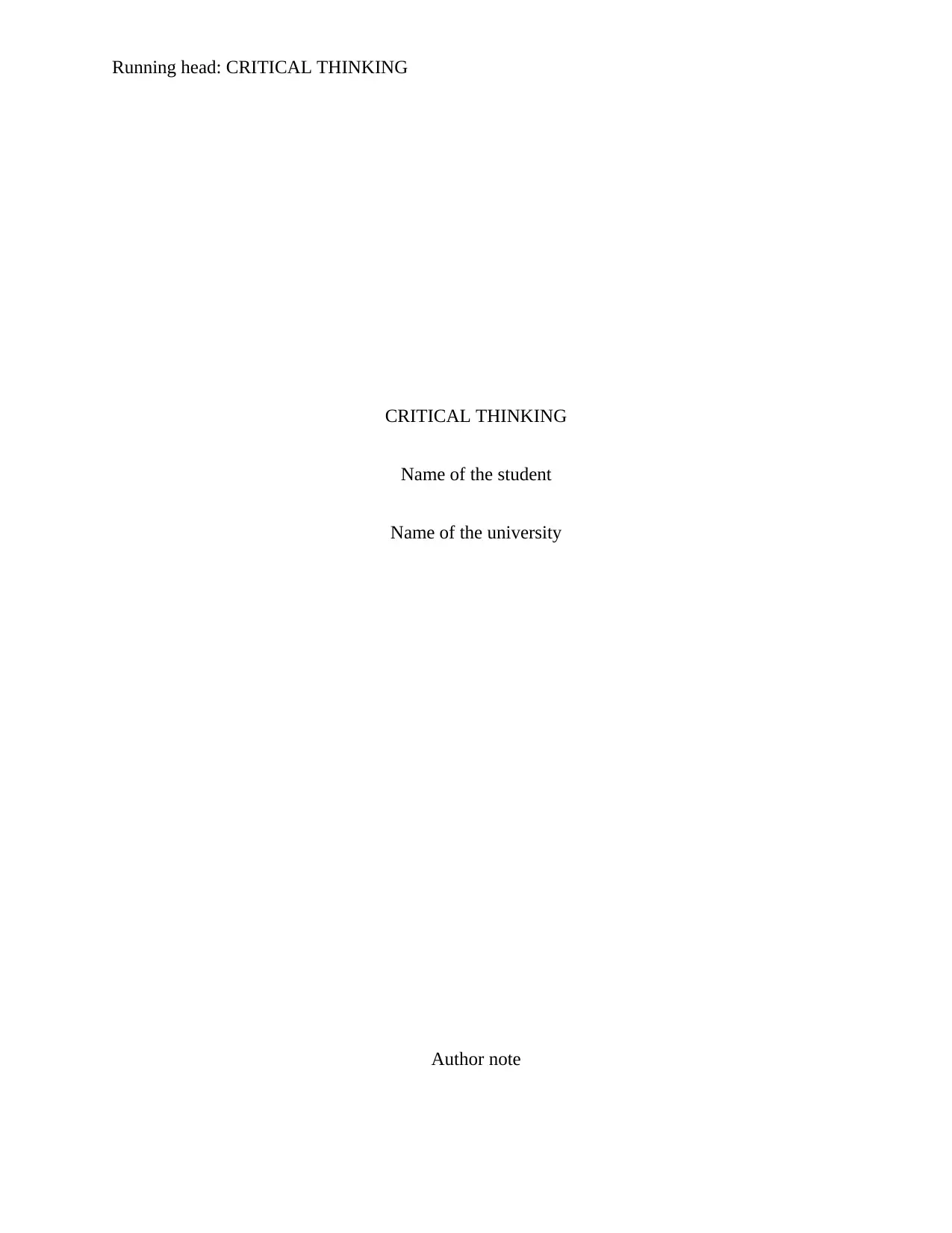
Running head: CRITICAL THINKING
CRITICAL THINKING
Name of the student
Name of the university
Author note
CRITICAL THINKING
Name of the student
Name of the university
Author note
Paraphrase This Document
Need a fresh take? Get an instant paraphrase of this document with our AI Paraphraser
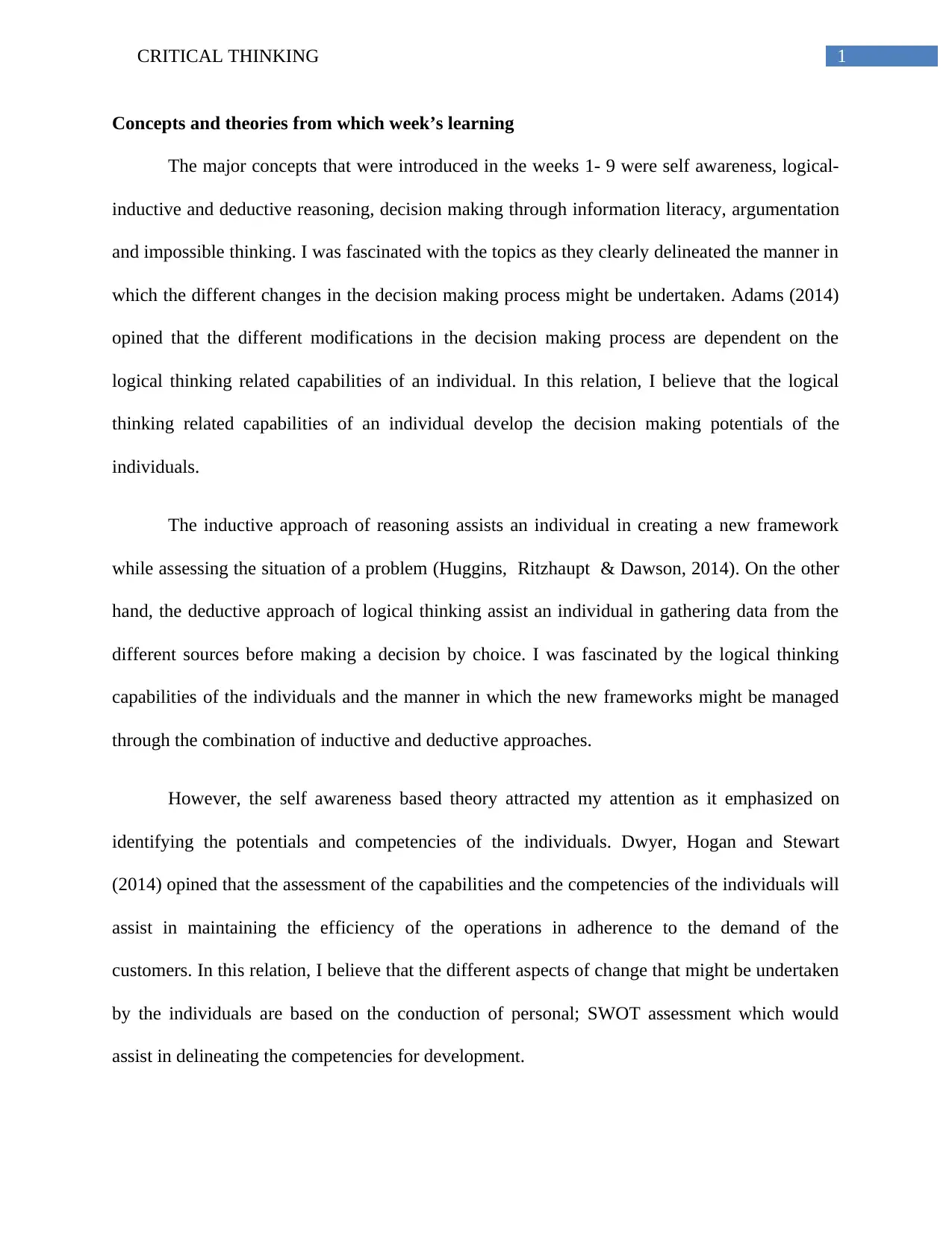
1CRITICAL THINKING
Concepts and theories from which week’s learning
The major concepts that were introduced in the weeks 1- 9 were self awareness, logical-
inductive and deductive reasoning, decision making through information literacy, argumentation
and impossible thinking. I was fascinated with the topics as they clearly delineated the manner in
which the different changes in the decision making process might be undertaken. Adams (2014)
opined that the different modifications in the decision making process are dependent on the
logical thinking related capabilities of an individual. In this relation, I believe that the logical
thinking related capabilities of an individual develop the decision making potentials of the
individuals.
The inductive approach of reasoning assists an individual in creating a new framework
while assessing the situation of a problem (Huggins, Ritzhaupt & Dawson, 2014). On the other
hand, the deductive approach of logical thinking assist an individual in gathering data from the
different sources before making a decision by choice. I was fascinated by the logical thinking
capabilities of the individuals and the manner in which the new frameworks might be managed
through the combination of inductive and deductive approaches.
However, the self awareness based theory attracted my attention as it emphasized on
identifying the potentials and competencies of the individuals. Dwyer, Hogan and Stewart
(2014) opined that the assessment of the capabilities and the competencies of the individuals will
assist in maintaining the efficiency of the operations in adherence to the demand of the
customers. In this relation, I believe that the different aspects of change that might be undertaken
by the individuals are based on the conduction of personal; SWOT assessment which would
assist in delineating the competencies for development.
Concepts and theories from which week’s learning
The major concepts that were introduced in the weeks 1- 9 were self awareness, logical-
inductive and deductive reasoning, decision making through information literacy, argumentation
and impossible thinking. I was fascinated with the topics as they clearly delineated the manner in
which the different changes in the decision making process might be undertaken. Adams (2014)
opined that the different modifications in the decision making process are dependent on the
logical thinking related capabilities of an individual. In this relation, I believe that the logical
thinking related capabilities of an individual develop the decision making potentials of the
individuals.
The inductive approach of reasoning assists an individual in creating a new framework
while assessing the situation of a problem (Huggins, Ritzhaupt & Dawson, 2014). On the other
hand, the deductive approach of logical thinking assist an individual in gathering data from the
different sources before making a decision by choice. I was fascinated by the logical thinking
capabilities of the individuals and the manner in which the new frameworks might be managed
through the combination of inductive and deductive approaches.
However, the self awareness based theory attracted my attention as it emphasized on
identifying the potentials and competencies of the individuals. Dwyer, Hogan and Stewart
(2014) opined that the assessment of the capabilities and the competencies of the individuals will
assist in maintaining the efficiency of the operations in adherence to the demand of the
customers. In this relation, I believe that the different aspects of change that might be undertaken
by the individuals are based on the conduction of personal; SWOT assessment which would
assist in delineating the competencies for development.
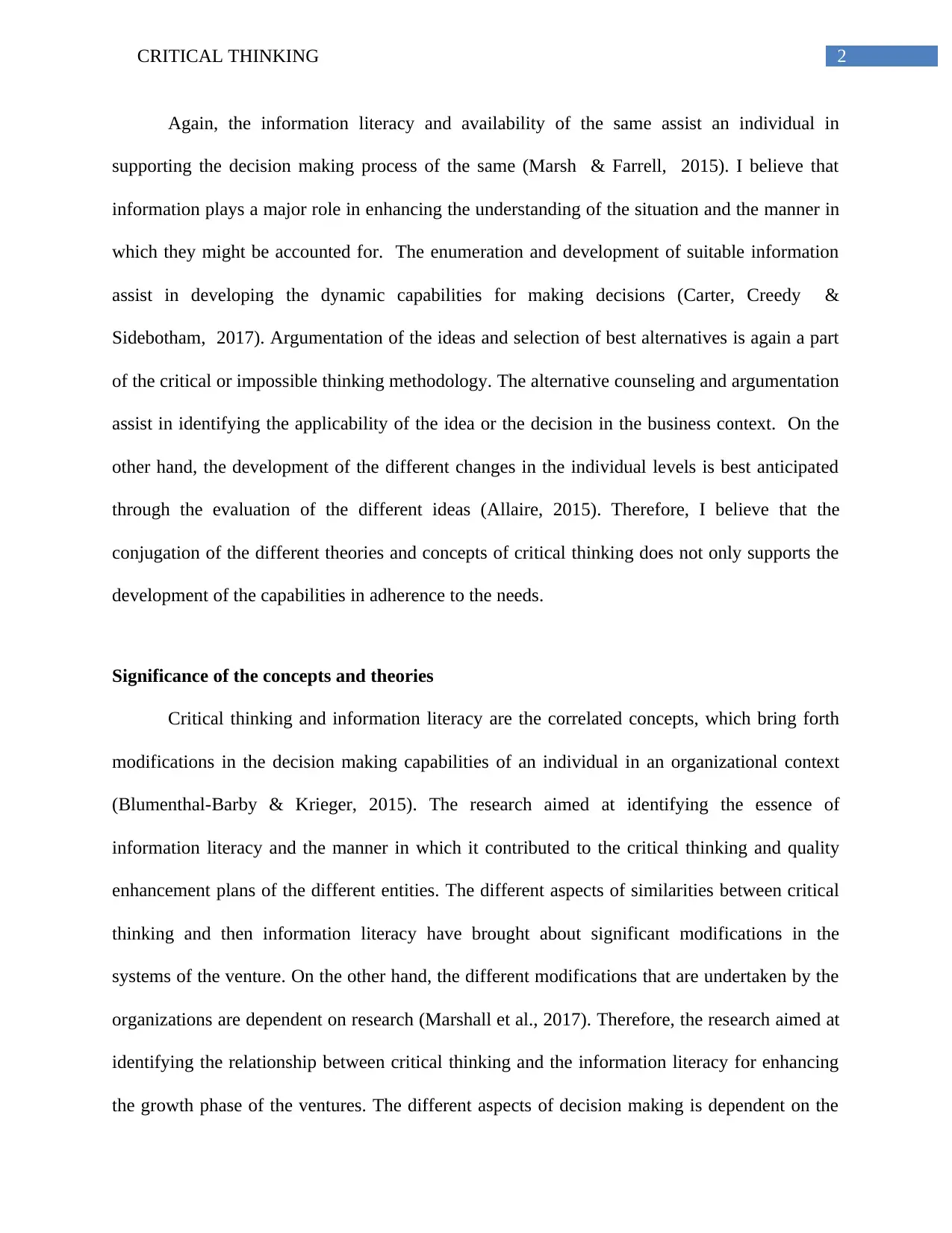
2CRITICAL THINKING
Again, the information literacy and availability of the same assist an individual in
supporting the decision making process of the same (Marsh & Farrell, 2015). I believe that
information plays a major role in enhancing the understanding of the situation and the manner in
which they might be accounted for. The enumeration and development of suitable information
assist in developing the dynamic capabilities for making decisions (Carter, Creedy &
Sidebotham, 2017). Argumentation of the ideas and selection of best alternatives is again a part
of the critical or impossible thinking methodology. The alternative counseling and argumentation
assist in identifying the applicability of the idea or the decision in the business context. On the
other hand, the development of the different changes in the individual levels is best anticipated
through the evaluation of the different ideas (Allaire, 2015). Therefore, I believe that the
conjugation of the different theories and concepts of critical thinking does not only supports the
development of the capabilities in adherence to the needs.
Significance of the concepts and theories
Critical thinking and information literacy are the correlated concepts, which bring forth
modifications in the decision making capabilities of an individual in an organizational context
(Blumenthal-Barby & Krieger, 2015). The research aimed at identifying the essence of
information literacy and the manner in which it contributed to the critical thinking and quality
enhancement plans of the different entities. The different aspects of similarities between critical
thinking and then information literacy have brought about significant modifications in the
systems of the venture. On the other hand, the different modifications that are undertaken by the
organizations are dependent on research (Marshall et al., 2017). Therefore, the research aimed at
identifying the relationship between critical thinking and the information literacy for enhancing
the growth phase of the ventures. The different aspects of decision making is dependent on the
Again, the information literacy and availability of the same assist an individual in
supporting the decision making process of the same (Marsh & Farrell, 2015). I believe that
information plays a major role in enhancing the understanding of the situation and the manner in
which they might be accounted for. The enumeration and development of suitable information
assist in developing the dynamic capabilities for making decisions (Carter, Creedy &
Sidebotham, 2017). Argumentation of the ideas and selection of best alternatives is again a part
of the critical or impossible thinking methodology. The alternative counseling and argumentation
assist in identifying the applicability of the idea or the decision in the business context. On the
other hand, the development of the different changes in the individual levels is best anticipated
through the evaluation of the different ideas (Allaire, 2015). Therefore, I believe that the
conjugation of the different theories and concepts of critical thinking does not only supports the
development of the capabilities in adherence to the needs.
Significance of the concepts and theories
Critical thinking and information literacy are the correlated concepts, which bring forth
modifications in the decision making capabilities of an individual in an organizational context
(Blumenthal-Barby & Krieger, 2015). The research aimed at identifying the essence of
information literacy and the manner in which it contributed to the critical thinking and quality
enhancement plans of the different entities. The different aspects of similarities between critical
thinking and then information literacy have brought about significant modifications in the
systems of the venture. On the other hand, the different modifications that are undertaken by the
organizations are dependent on research (Marshall et al., 2017). Therefore, the research aimed at
identifying the relationship between critical thinking and the information literacy for enhancing
the growth phase of the ventures. The different aspects of decision making is dependent on the
⊘ This is a preview!⊘
Do you want full access?
Subscribe today to unlock all pages.

Trusted by 1+ million students worldwide
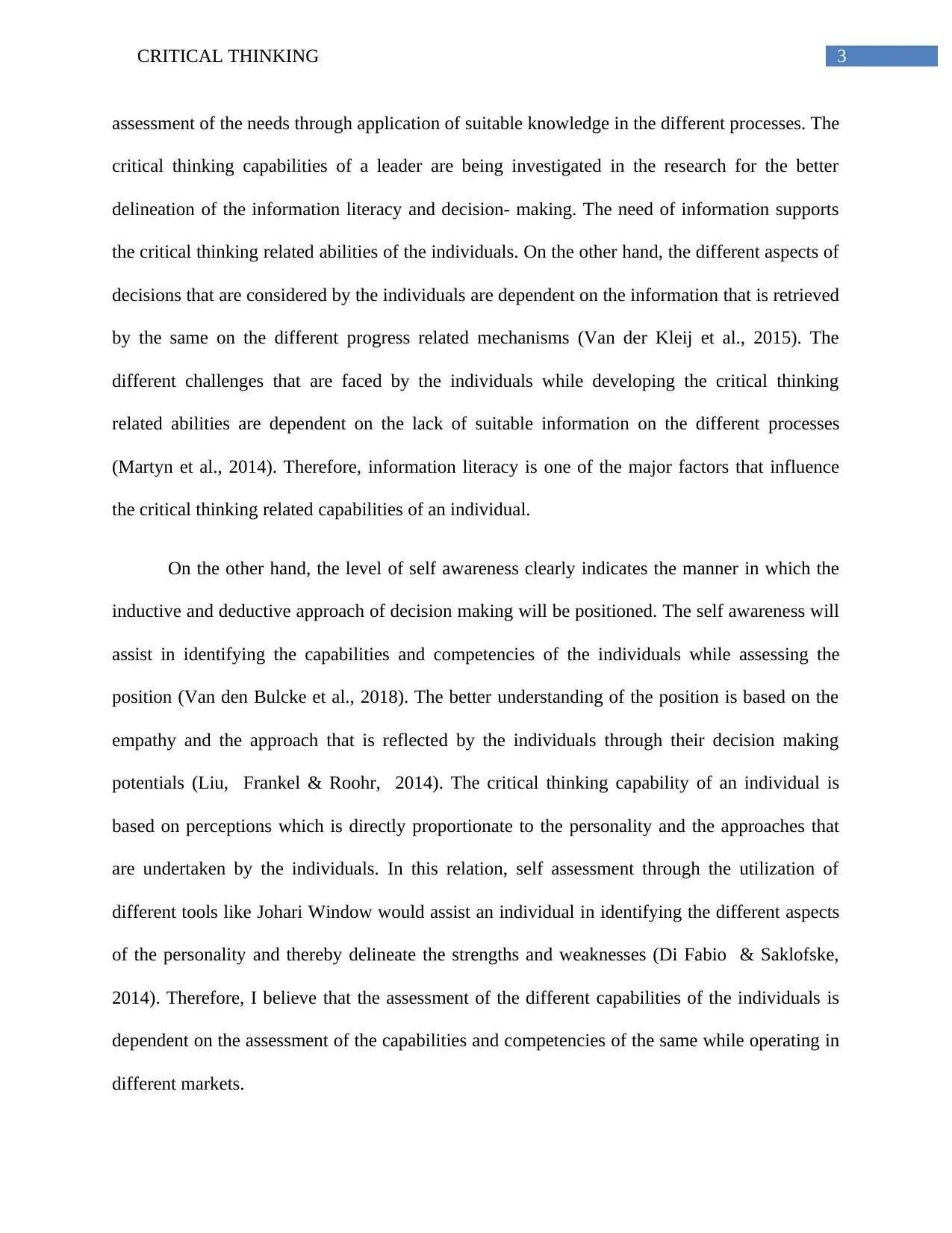
3CRITICAL THINKING
assessment of the needs through application of suitable knowledge in the different processes. The
critical thinking capabilities of a leader are being investigated in the research for the better
delineation of the information literacy and decision- making. The need of information supports
the critical thinking related abilities of the individuals. On the other hand, the different aspects of
decisions that are considered by the individuals are dependent on the information that is retrieved
by the same on the different progress related mechanisms (Van der Kleij et al., 2015). The
different challenges that are faced by the individuals while developing the critical thinking
related abilities are dependent on the lack of suitable information on the different processes
(Martyn et al., 2014). Therefore, information literacy is one of the major factors that influence
the critical thinking related capabilities of an individual.
On the other hand, the level of self awareness clearly indicates the manner in which the
inductive and deductive approach of decision making will be positioned. The self awareness will
assist in identifying the capabilities and competencies of the individuals while assessing the
position (Van den Bulcke et al., 2018). The better understanding of the position is based on the
empathy and the approach that is reflected by the individuals through their decision making
potentials (Liu, Frankel & Roohr, 2014). The critical thinking capability of an individual is
based on perceptions which is directly proportionate to the personality and the approaches that
are undertaken by the individuals. In this relation, self assessment through the utilization of
different tools like Johari Window would assist an individual in identifying the different aspects
of the personality and thereby delineate the strengths and weaknesses (Di Fabio & Saklofske,
2014). Therefore, I believe that the assessment of the different capabilities of the individuals is
dependent on the assessment of the capabilities and competencies of the same while operating in
different markets.
assessment of the needs through application of suitable knowledge in the different processes. The
critical thinking capabilities of a leader are being investigated in the research for the better
delineation of the information literacy and decision- making. The need of information supports
the critical thinking related abilities of the individuals. On the other hand, the different aspects of
decisions that are considered by the individuals are dependent on the information that is retrieved
by the same on the different progress related mechanisms (Van der Kleij et al., 2015). The
different challenges that are faced by the individuals while developing the critical thinking
related abilities are dependent on the lack of suitable information on the different processes
(Martyn et al., 2014). Therefore, information literacy is one of the major factors that influence
the critical thinking related capabilities of an individual.
On the other hand, the level of self awareness clearly indicates the manner in which the
inductive and deductive approach of decision making will be positioned. The self awareness will
assist in identifying the capabilities and competencies of the individuals while assessing the
position (Van den Bulcke et al., 2018). The better understanding of the position is based on the
empathy and the approach that is reflected by the individuals through their decision making
potentials (Liu, Frankel & Roohr, 2014). The critical thinking capability of an individual is
based on perceptions which is directly proportionate to the personality and the approaches that
are undertaken by the individuals. In this relation, self assessment through the utilization of
different tools like Johari Window would assist an individual in identifying the different aspects
of the personality and thereby delineate the strengths and weaknesses (Di Fabio & Saklofske,
2014). Therefore, I believe that the assessment of the different capabilities of the individuals is
dependent on the assessment of the capabilities and competencies of the same while operating in
different markets.
Paraphrase This Document
Need a fresh take? Get an instant paraphrase of this document with our AI Paraphraser
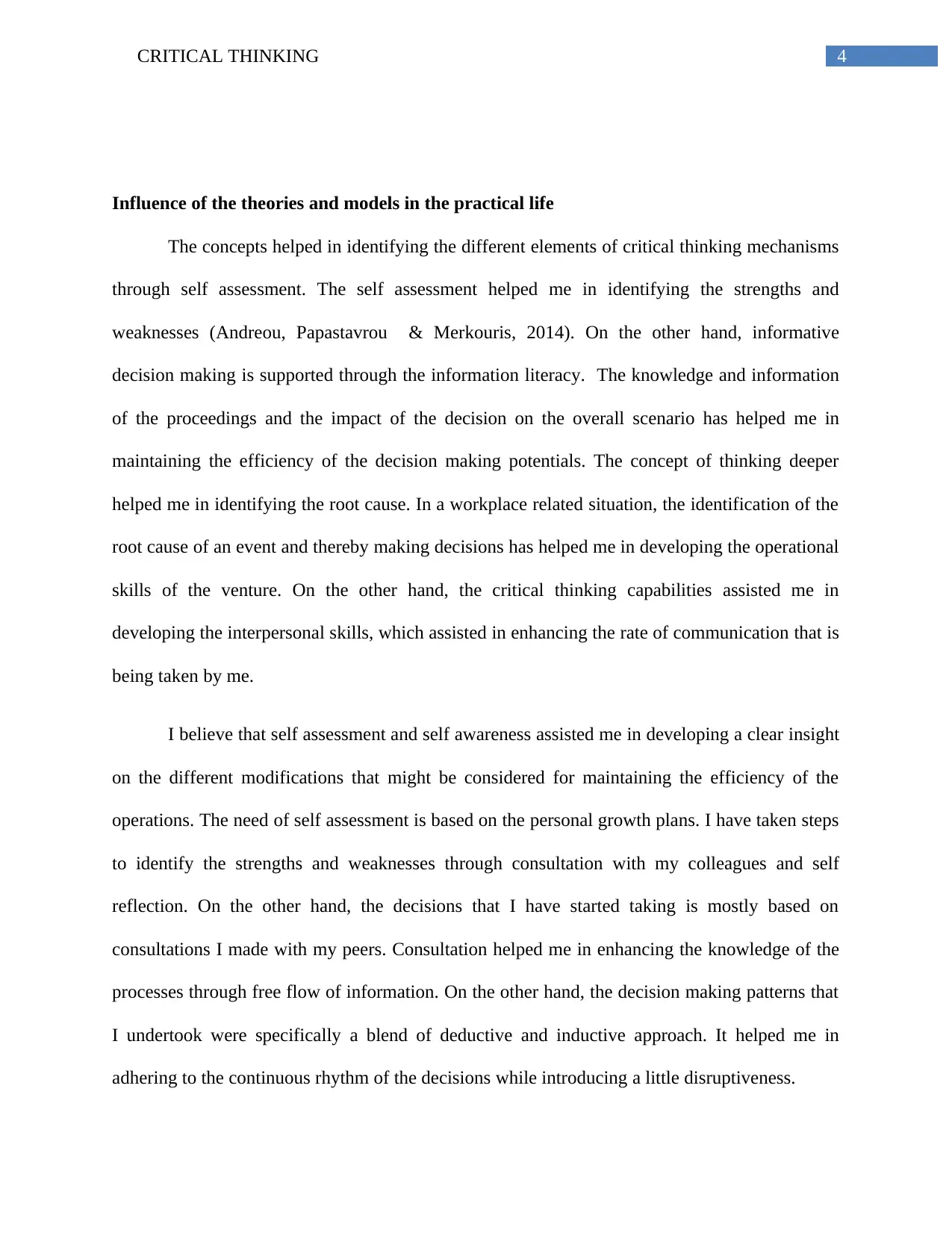
4CRITICAL THINKING
Influence of the theories and models in the practical life
The concepts helped in identifying the different elements of critical thinking mechanisms
through self assessment. The self assessment helped me in identifying the strengths and
weaknesses (Andreou, Papastavrou & Merkouris, 2014). On the other hand, informative
decision making is supported through the information literacy. The knowledge and information
of the proceedings and the impact of the decision on the overall scenario has helped me in
maintaining the efficiency of the decision making potentials. The concept of thinking deeper
helped me in identifying the root cause. In a workplace related situation, the identification of the
root cause of an event and thereby making decisions has helped me in developing the operational
skills of the venture. On the other hand, the critical thinking capabilities assisted me in
developing the interpersonal skills, which assisted in enhancing the rate of communication that is
being taken by me.
I believe that self assessment and self awareness assisted me in developing a clear insight
on the different modifications that might be considered for maintaining the efficiency of the
operations. The need of self assessment is based on the personal growth plans. I have taken steps
to identify the strengths and weaknesses through consultation with my colleagues and self
reflection. On the other hand, the decisions that I have started taking is mostly based on
consultations I made with my peers. Consultation helped me in enhancing the knowledge of the
processes through free flow of information. On the other hand, the decision making patterns that
I undertook were specifically a blend of deductive and inductive approach. It helped me in
adhering to the continuous rhythm of the decisions while introducing a little disruptiveness.
Influence of the theories and models in the practical life
The concepts helped in identifying the different elements of critical thinking mechanisms
through self assessment. The self assessment helped me in identifying the strengths and
weaknesses (Andreou, Papastavrou & Merkouris, 2014). On the other hand, informative
decision making is supported through the information literacy. The knowledge and information
of the proceedings and the impact of the decision on the overall scenario has helped me in
maintaining the efficiency of the decision making potentials. The concept of thinking deeper
helped me in identifying the root cause. In a workplace related situation, the identification of the
root cause of an event and thereby making decisions has helped me in developing the operational
skills of the venture. On the other hand, the critical thinking capabilities assisted me in
developing the interpersonal skills, which assisted in enhancing the rate of communication that is
being taken by me.
I believe that self assessment and self awareness assisted me in developing a clear insight
on the different modifications that might be considered for maintaining the efficiency of the
operations. The need of self assessment is based on the personal growth plans. I have taken steps
to identify the strengths and weaknesses through consultation with my colleagues and self
reflection. On the other hand, the decisions that I have started taking is mostly based on
consultations I made with my peers. Consultation helped me in enhancing the knowledge of the
processes through free flow of information. On the other hand, the decision making patterns that
I undertook were specifically a blend of deductive and inductive approach. It helped me in
adhering to the continuous rhythm of the decisions while introducing a little disruptiveness.
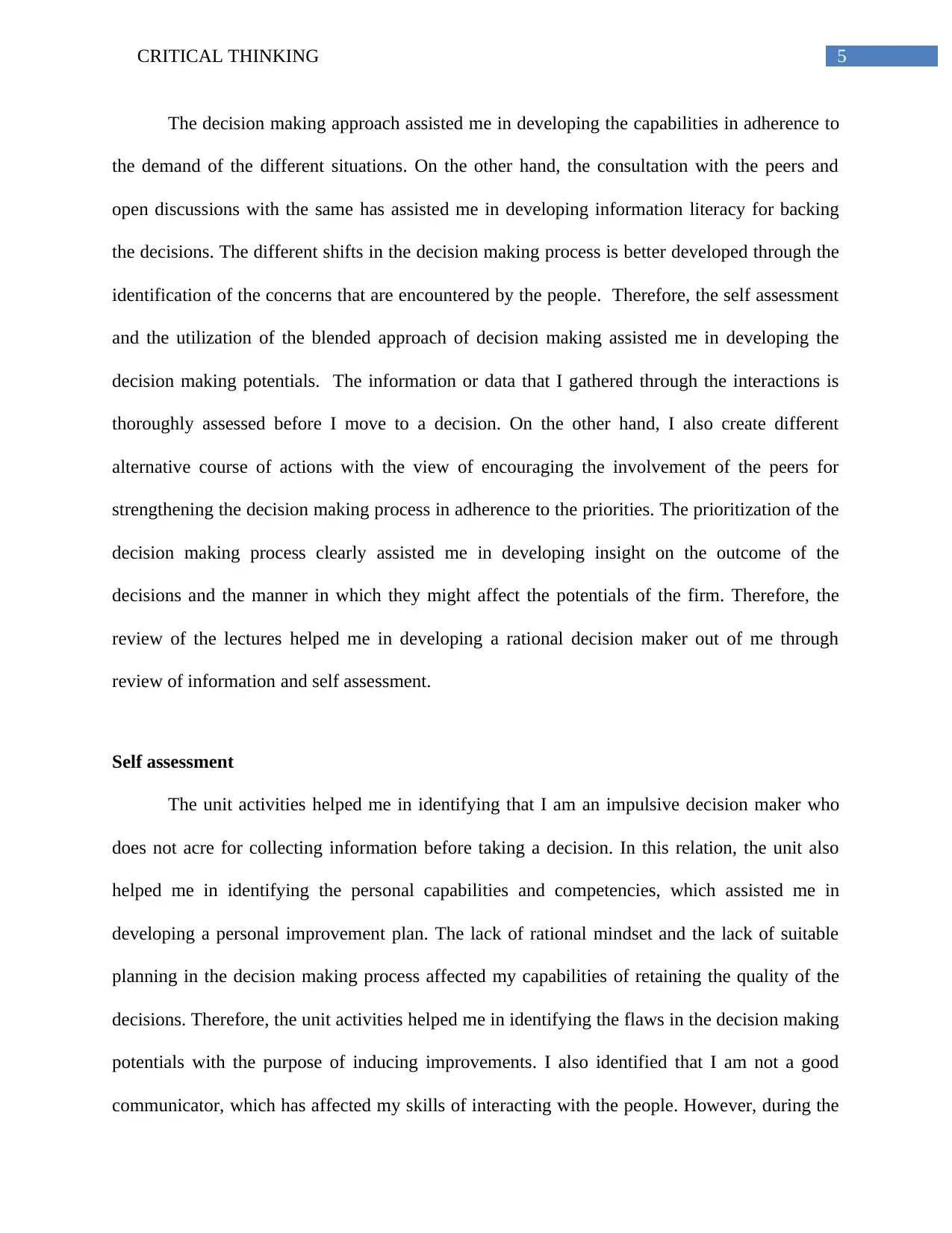
5CRITICAL THINKING
The decision making approach assisted me in developing the capabilities in adherence to
the demand of the different situations. On the other hand, the consultation with the peers and
open discussions with the same has assisted me in developing information literacy for backing
the decisions. The different shifts in the decision making process is better developed through the
identification of the concerns that are encountered by the people. Therefore, the self assessment
and the utilization of the blended approach of decision making assisted me in developing the
decision making potentials. The information or data that I gathered through the interactions is
thoroughly assessed before I move to a decision. On the other hand, I also create different
alternative course of actions with the view of encouraging the involvement of the peers for
strengthening the decision making process in adherence to the priorities. The prioritization of the
decision making process clearly assisted me in developing insight on the outcome of the
decisions and the manner in which they might affect the potentials of the firm. Therefore, the
review of the lectures helped me in developing a rational decision maker out of me through
review of information and self assessment.
Self assessment
The unit activities helped me in identifying that I am an impulsive decision maker who
does not acre for collecting information before taking a decision. In this relation, the unit also
helped me in identifying the personal capabilities and competencies, which assisted me in
developing a personal improvement plan. The lack of rational mindset and the lack of suitable
planning in the decision making process affected my capabilities of retaining the quality of the
decisions. Therefore, the unit activities helped me in identifying the flaws in the decision making
potentials with the purpose of inducing improvements. I also identified that I am not a good
communicator, which has affected my skills of interacting with the people. However, during the
The decision making approach assisted me in developing the capabilities in adherence to
the demand of the different situations. On the other hand, the consultation with the peers and
open discussions with the same has assisted me in developing information literacy for backing
the decisions. The different shifts in the decision making process is better developed through the
identification of the concerns that are encountered by the people. Therefore, the self assessment
and the utilization of the blended approach of decision making assisted me in developing the
decision making potentials. The information or data that I gathered through the interactions is
thoroughly assessed before I move to a decision. On the other hand, I also create different
alternative course of actions with the view of encouraging the involvement of the peers for
strengthening the decision making process in adherence to the priorities. The prioritization of the
decision making process clearly assisted me in developing insight on the outcome of the
decisions and the manner in which they might affect the potentials of the firm. Therefore, the
review of the lectures helped me in developing a rational decision maker out of me through
review of information and self assessment.
Self assessment
The unit activities helped me in identifying that I am an impulsive decision maker who
does not acre for collecting information before taking a decision. In this relation, the unit also
helped me in identifying the personal capabilities and competencies, which assisted me in
developing a personal improvement plan. The lack of rational mindset and the lack of suitable
planning in the decision making process affected my capabilities of retaining the quality of the
decisions. Therefore, the unit activities helped me in identifying the flaws in the decision making
potentials with the purpose of inducing improvements. I also identified that I am not a good
communicator, which has affected my skills of interacting with the people. However, during the
⊘ This is a preview!⊘
Do you want full access?
Subscribe today to unlock all pages.

Trusted by 1+ million students worldwide
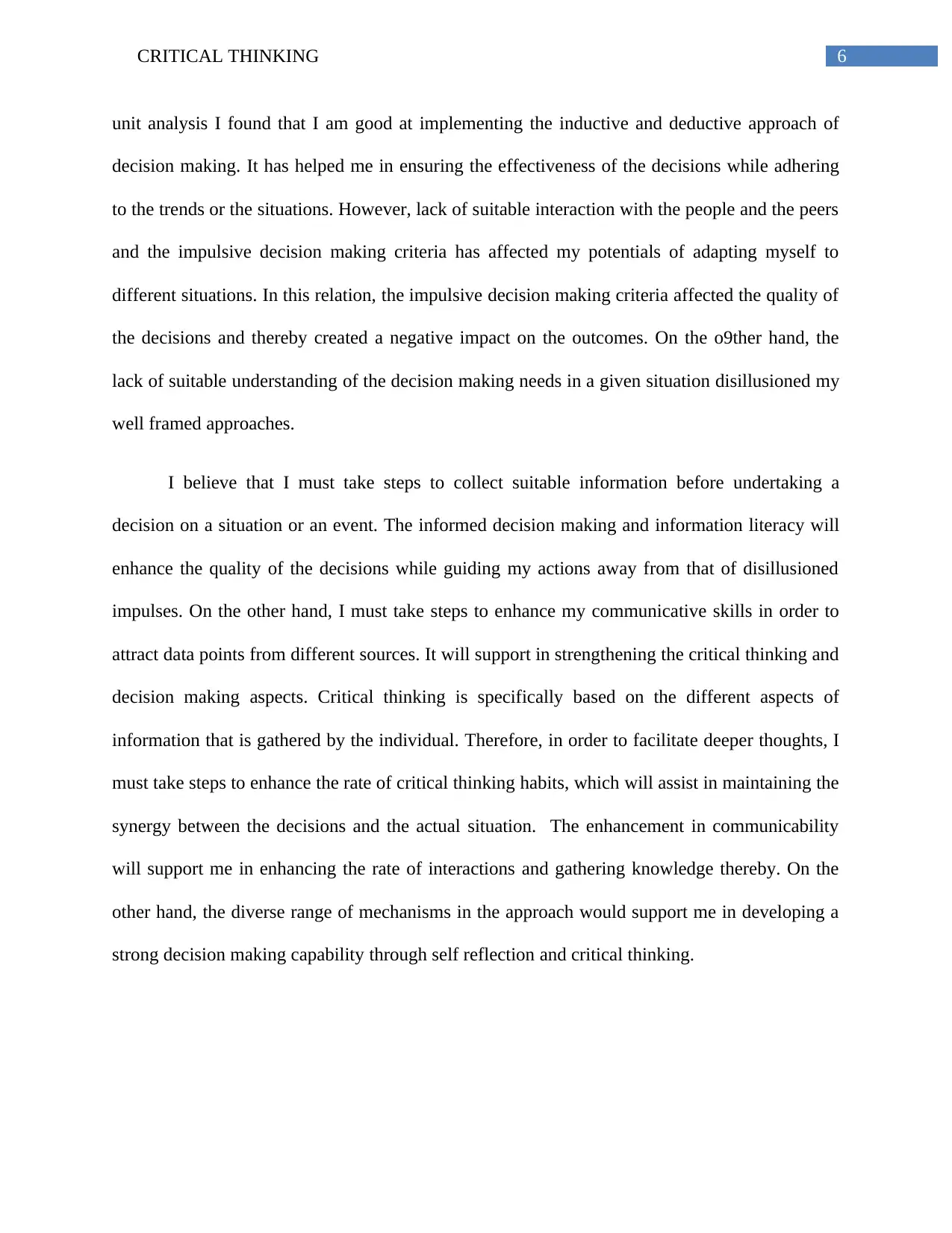
6CRITICAL THINKING
unit analysis I found that I am good at implementing the inductive and deductive approach of
decision making. It has helped me in ensuring the effectiveness of the decisions while adhering
to the trends or the situations. However, lack of suitable interaction with the people and the peers
and the impulsive decision making criteria has affected my potentials of adapting myself to
different situations. In this relation, the impulsive decision making criteria affected the quality of
the decisions and thereby created a negative impact on the outcomes. On the o9ther hand, the
lack of suitable understanding of the decision making needs in a given situation disillusioned my
well framed approaches.
I believe that I must take steps to collect suitable information before undertaking a
decision on a situation or an event. The informed decision making and information literacy will
enhance the quality of the decisions while guiding my actions away from that of disillusioned
impulses. On the other hand, I must take steps to enhance my communicative skills in order to
attract data points from different sources. It will support in strengthening the critical thinking and
decision making aspects. Critical thinking is specifically based on the different aspects of
information that is gathered by the individual. Therefore, in order to facilitate deeper thoughts, I
must take steps to enhance the rate of critical thinking habits, which will assist in maintaining the
synergy between the decisions and the actual situation. The enhancement in communicability
will support me in enhancing the rate of interactions and gathering knowledge thereby. On the
other hand, the diverse range of mechanisms in the approach would support me in developing a
strong decision making capability through self reflection and critical thinking.
unit analysis I found that I am good at implementing the inductive and deductive approach of
decision making. It has helped me in ensuring the effectiveness of the decisions while adhering
to the trends or the situations. However, lack of suitable interaction with the people and the peers
and the impulsive decision making criteria has affected my potentials of adapting myself to
different situations. In this relation, the impulsive decision making criteria affected the quality of
the decisions and thereby created a negative impact on the outcomes. On the o9ther hand, the
lack of suitable understanding of the decision making needs in a given situation disillusioned my
well framed approaches.
I believe that I must take steps to collect suitable information before undertaking a
decision on a situation or an event. The informed decision making and information literacy will
enhance the quality of the decisions while guiding my actions away from that of disillusioned
impulses. On the other hand, I must take steps to enhance my communicative skills in order to
attract data points from different sources. It will support in strengthening the critical thinking and
decision making aspects. Critical thinking is specifically based on the different aspects of
information that is gathered by the individual. Therefore, in order to facilitate deeper thoughts, I
must take steps to enhance the rate of critical thinking habits, which will assist in maintaining the
synergy between the decisions and the actual situation. The enhancement in communicability
will support me in enhancing the rate of interactions and gathering knowledge thereby. On the
other hand, the diverse range of mechanisms in the approach would support me in developing a
strong decision making capability through self reflection and critical thinking.
Paraphrase This Document
Need a fresh take? Get an instant paraphrase of this document with our AI Paraphraser
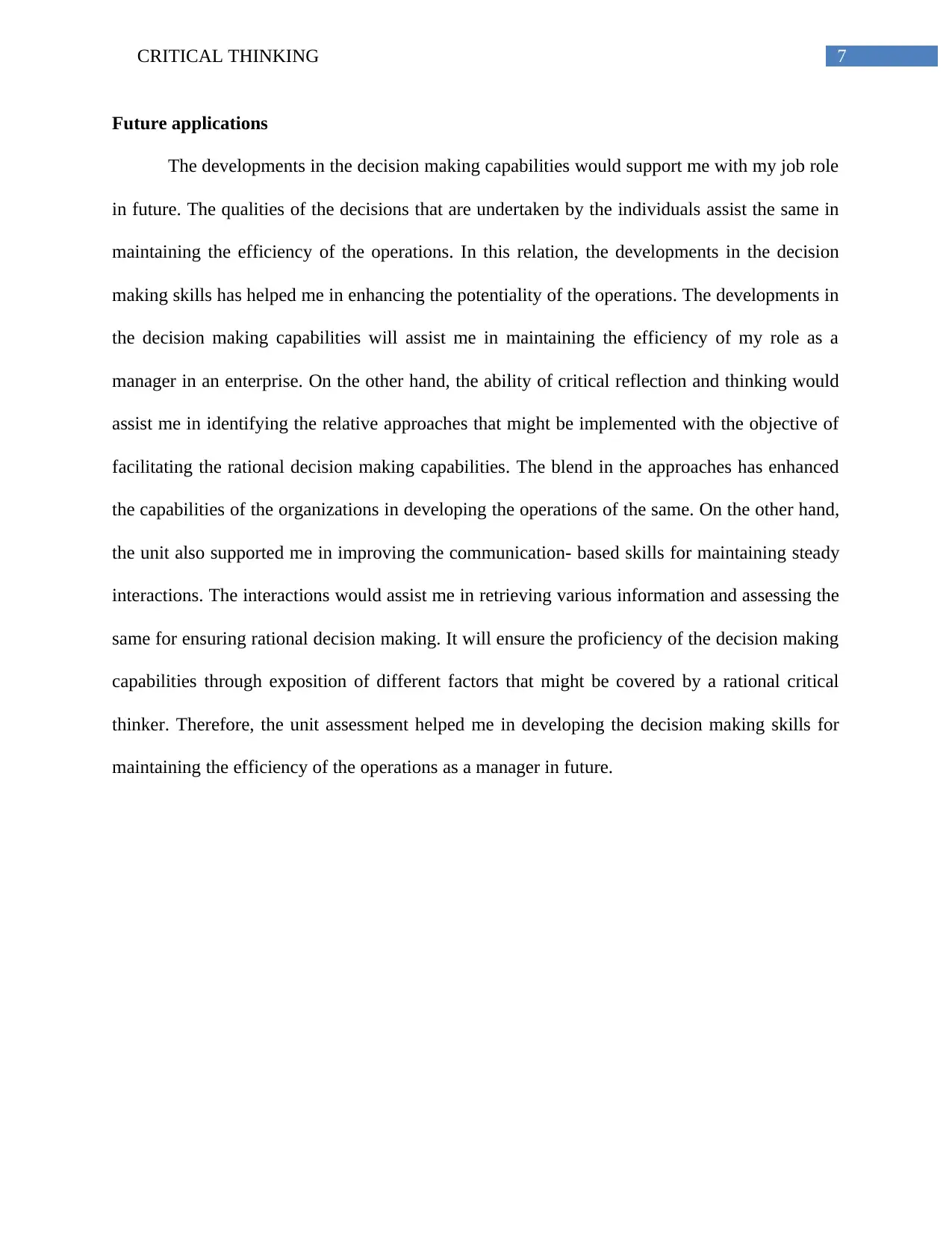
7CRITICAL THINKING
Future applications
The developments in the decision making capabilities would support me with my job role
in future. The qualities of the decisions that are undertaken by the individuals assist the same in
maintaining the efficiency of the operations. In this relation, the developments in the decision
making skills has helped me in enhancing the potentiality of the operations. The developments in
the decision making capabilities will assist me in maintaining the efficiency of my role as a
manager in an enterprise. On the other hand, the ability of critical reflection and thinking would
assist me in identifying the relative approaches that might be implemented with the objective of
facilitating the rational decision making capabilities. The blend in the approaches has enhanced
the capabilities of the organizations in developing the operations of the same. On the other hand,
the unit also supported me in improving the communication- based skills for maintaining steady
interactions. The interactions would assist me in retrieving various information and assessing the
same for ensuring rational decision making. It will ensure the proficiency of the decision making
capabilities through exposition of different factors that might be covered by a rational critical
thinker. Therefore, the unit assessment helped me in developing the decision making skills for
maintaining the efficiency of the operations as a manager in future.
Future applications
The developments in the decision making capabilities would support me with my job role
in future. The qualities of the decisions that are undertaken by the individuals assist the same in
maintaining the efficiency of the operations. In this relation, the developments in the decision
making skills has helped me in enhancing the potentiality of the operations. The developments in
the decision making capabilities will assist me in maintaining the efficiency of my role as a
manager in an enterprise. On the other hand, the ability of critical reflection and thinking would
assist me in identifying the relative approaches that might be implemented with the objective of
facilitating the rational decision making capabilities. The blend in the approaches has enhanced
the capabilities of the organizations in developing the operations of the same. On the other hand,
the unit also supported me in improving the communication- based skills for maintaining steady
interactions. The interactions would assist me in retrieving various information and assessing the
same for ensuring rational decision making. It will ensure the proficiency of the decision making
capabilities through exposition of different factors that might be covered by a rational critical
thinker. Therefore, the unit assessment helped me in developing the decision making skills for
maintaining the efficiency of the operations as a manager in future.
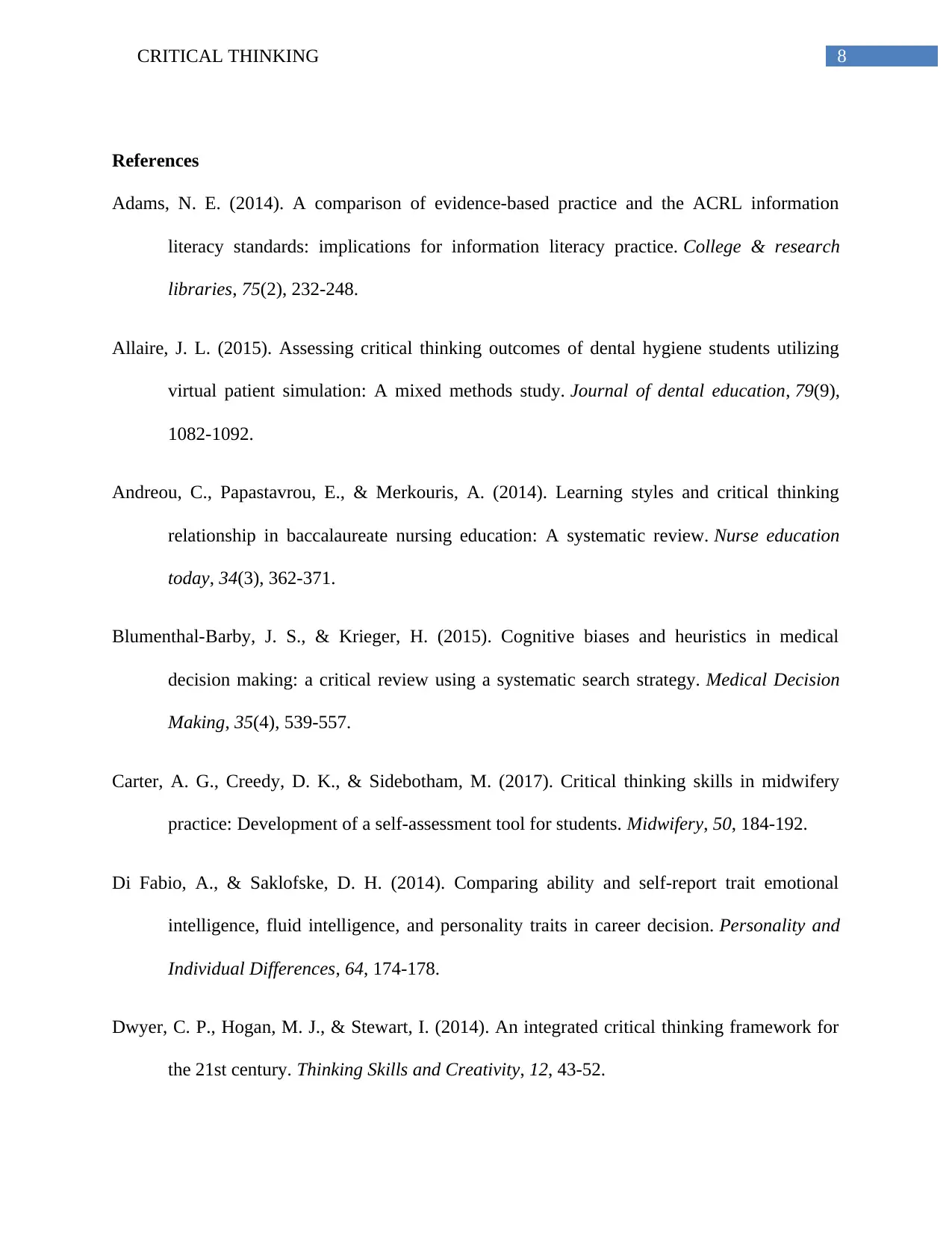
8CRITICAL THINKING
References
Adams, N. E. (2014). A comparison of evidence-based practice and the ACRL information
literacy standards: implications for information literacy practice. College & research
libraries, 75(2), 232-248.
Allaire, J. L. (2015). Assessing critical thinking outcomes of dental hygiene students utilizing
virtual patient simulation: A mixed methods study. Journal of dental education, 79(9),
1082-1092.
Andreou, C., Papastavrou, E., & Merkouris, A. (2014). Learning styles and critical thinking
relationship in baccalaureate nursing education: A systematic review. Nurse education
today, 34(3), 362-371.
Blumenthal-Barby, J. S., & Krieger, H. (2015). Cognitive biases and heuristics in medical
decision making: a critical review using a systematic search strategy. Medical Decision
Making, 35(4), 539-557.
Carter, A. G., Creedy, D. K., & Sidebotham, M. (2017). Critical thinking skills in midwifery
practice: Development of a self-assessment tool for students. Midwifery, 50, 184-192.
Di Fabio, A., & Saklofske, D. H. (2014). Comparing ability and self-report trait emotional
intelligence, fluid intelligence, and personality traits in career decision. Personality and
Individual Differences, 64, 174-178.
Dwyer, C. P., Hogan, M. J., & Stewart, I. (2014). An integrated critical thinking framework for
the 21st century. Thinking Skills and Creativity, 12, 43-52.
References
Adams, N. E. (2014). A comparison of evidence-based practice and the ACRL information
literacy standards: implications for information literacy practice. College & research
libraries, 75(2), 232-248.
Allaire, J. L. (2015). Assessing critical thinking outcomes of dental hygiene students utilizing
virtual patient simulation: A mixed methods study. Journal of dental education, 79(9),
1082-1092.
Andreou, C., Papastavrou, E., & Merkouris, A. (2014). Learning styles and critical thinking
relationship in baccalaureate nursing education: A systematic review. Nurse education
today, 34(3), 362-371.
Blumenthal-Barby, J. S., & Krieger, H. (2015). Cognitive biases and heuristics in medical
decision making: a critical review using a systematic search strategy. Medical Decision
Making, 35(4), 539-557.
Carter, A. G., Creedy, D. K., & Sidebotham, M. (2017). Critical thinking skills in midwifery
practice: Development of a self-assessment tool for students. Midwifery, 50, 184-192.
Di Fabio, A., & Saklofske, D. H. (2014). Comparing ability and self-report trait emotional
intelligence, fluid intelligence, and personality traits in career decision. Personality and
Individual Differences, 64, 174-178.
Dwyer, C. P., Hogan, M. J., & Stewart, I. (2014). An integrated critical thinking framework for
the 21st century. Thinking Skills and Creativity, 12, 43-52.
⊘ This is a preview!⊘
Do you want full access?
Subscribe today to unlock all pages.

Trusted by 1+ million students worldwide
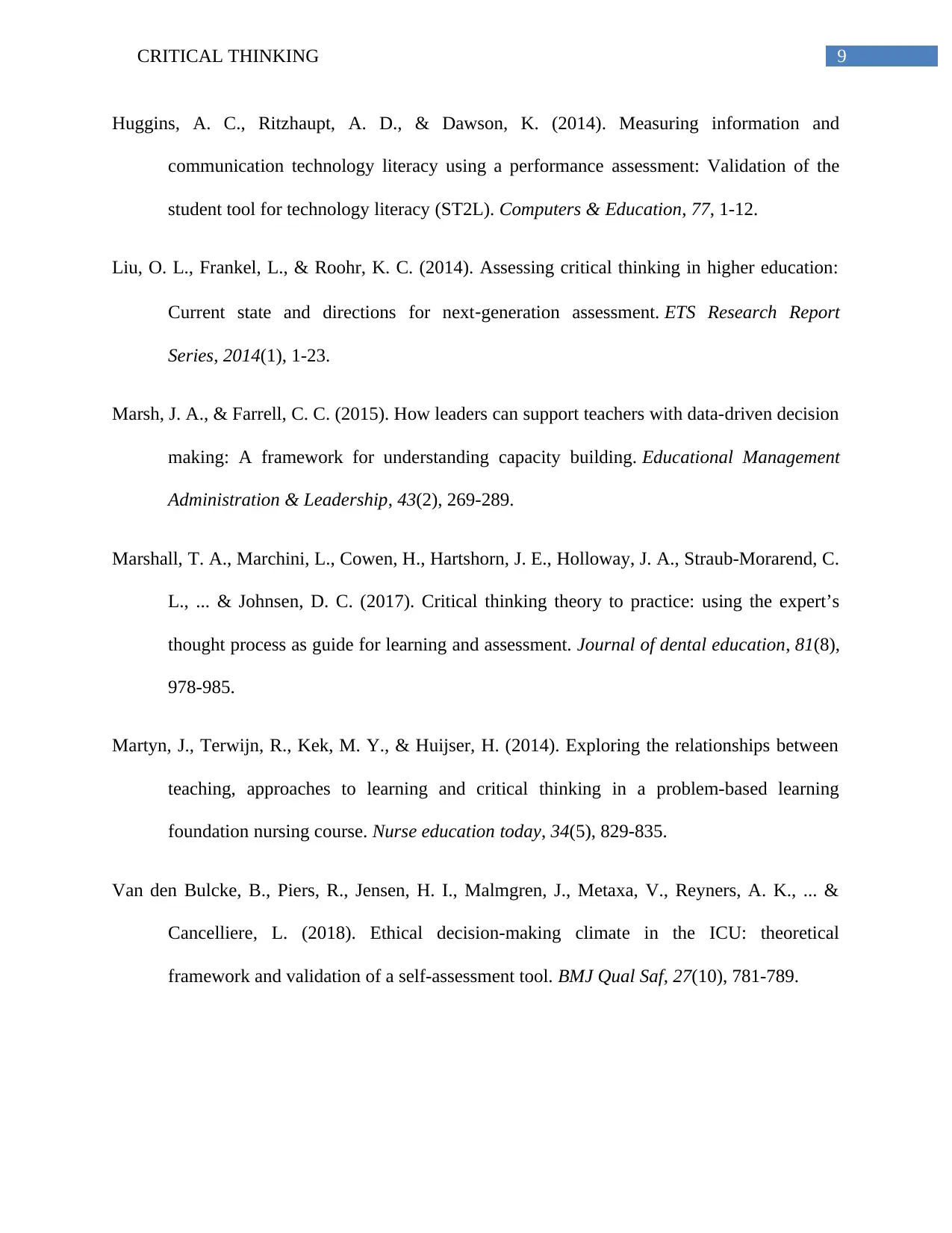
9CRITICAL THINKING
Huggins, A. C., Ritzhaupt, A. D., & Dawson, K. (2014). Measuring information and
communication technology literacy using a performance assessment: Validation of the
student tool for technology literacy (ST2L). Computers & Education, 77, 1-12.
Liu, O. L., Frankel, L., & Roohr, K. C. (2014). Assessing critical thinking in higher education:
Current state and directions for next‐generation assessment. ETS Research Report
Series, 2014(1), 1-23.
Marsh, J. A., & Farrell, C. C. (2015). How leaders can support teachers with data-driven decision
making: A framework for understanding capacity building. Educational Management
Administration & Leadership, 43(2), 269-289.
Marshall, T. A., Marchini, L., Cowen, H., Hartshorn, J. E., Holloway, J. A., Straub-Morarend, C.
L., ... & Johnsen, D. C. (2017). Critical thinking theory to practice: using the expert’s
thought process as guide for learning and assessment. Journal of dental education, 81(8),
978-985.
Martyn, J., Terwijn, R., Kek, M. Y., & Huijser, H. (2014). Exploring the relationships between
teaching, approaches to learning and critical thinking in a problem-based learning
foundation nursing course. Nurse education today, 34(5), 829-835.
Van den Bulcke, B., Piers, R., Jensen, H. I., Malmgren, J., Metaxa, V., Reyners, A. K., ... &
Cancelliere, L. (2018). Ethical decision-making climate in the ICU: theoretical
framework and validation of a self-assessment tool. BMJ Qual Saf, 27(10), 781-789.
Huggins, A. C., Ritzhaupt, A. D., & Dawson, K. (2014). Measuring information and
communication technology literacy using a performance assessment: Validation of the
student tool for technology literacy (ST2L). Computers & Education, 77, 1-12.
Liu, O. L., Frankel, L., & Roohr, K. C. (2014). Assessing critical thinking in higher education:
Current state and directions for next‐generation assessment. ETS Research Report
Series, 2014(1), 1-23.
Marsh, J. A., & Farrell, C. C. (2015). How leaders can support teachers with data-driven decision
making: A framework for understanding capacity building. Educational Management
Administration & Leadership, 43(2), 269-289.
Marshall, T. A., Marchini, L., Cowen, H., Hartshorn, J. E., Holloway, J. A., Straub-Morarend, C.
L., ... & Johnsen, D. C. (2017). Critical thinking theory to practice: using the expert’s
thought process as guide for learning and assessment. Journal of dental education, 81(8),
978-985.
Martyn, J., Terwijn, R., Kek, M. Y., & Huijser, H. (2014). Exploring the relationships between
teaching, approaches to learning and critical thinking in a problem-based learning
foundation nursing course. Nurse education today, 34(5), 829-835.
Van den Bulcke, B., Piers, R., Jensen, H. I., Malmgren, J., Metaxa, V., Reyners, A. K., ... &
Cancelliere, L. (2018). Ethical decision-making climate in the ICU: theoretical
framework and validation of a self-assessment tool. BMJ Qual Saf, 27(10), 781-789.
Paraphrase This Document
Need a fresh take? Get an instant paraphrase of this document with our AI Paraphraser
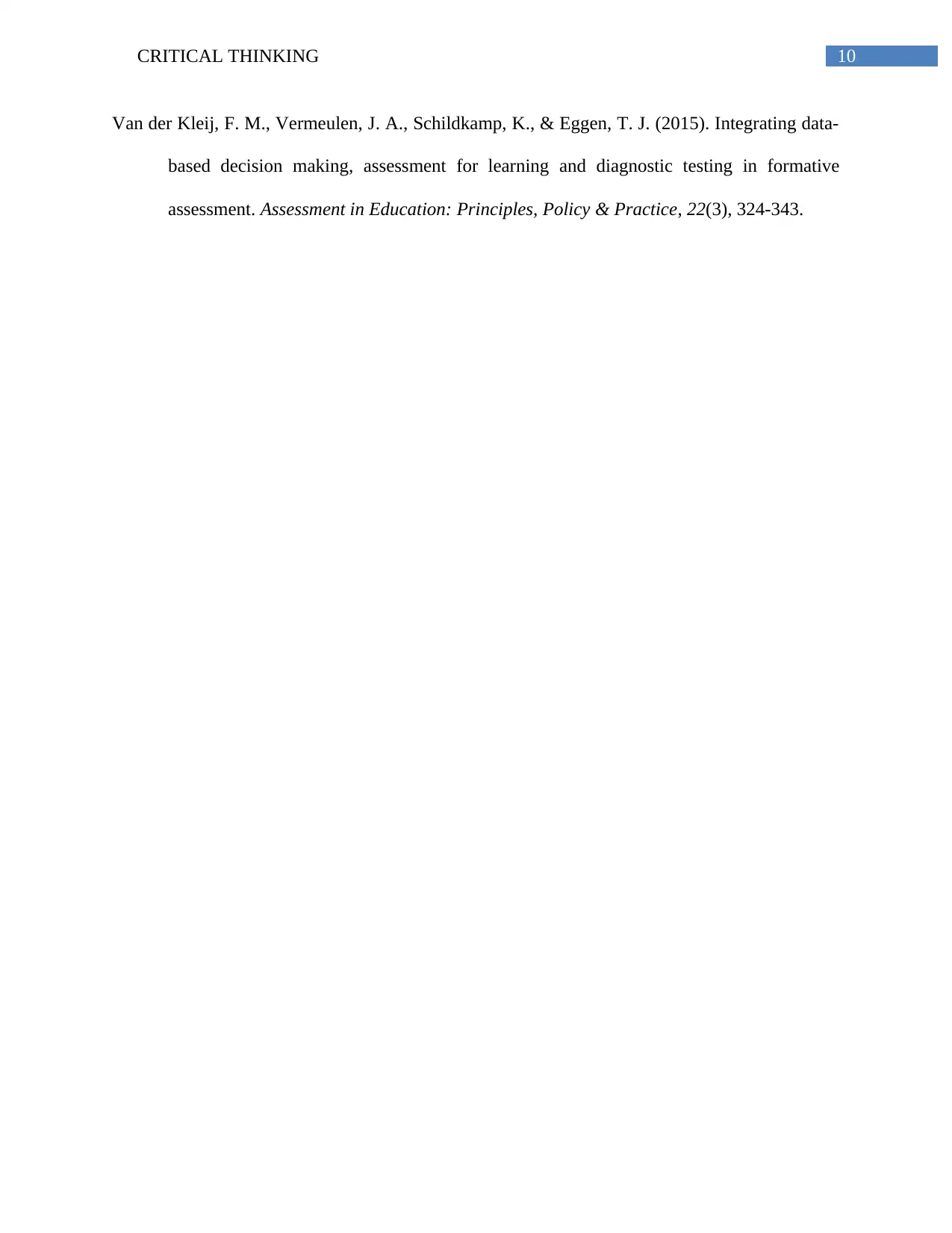
10CRITICAL THINKING
Van der Kleij, F. M., Vermeulen, J. A., Schildkamp, K., & Eggen, T. J. (2015). Integrating data-
based decision making, assessment for learning and diagnostic testing in formative
assessment. Assessment in Education: Principles, Policy & Practice, 22(3), 324-343.
Van der Kleij, F. M., Vermeulen, J. A., Schildkamp, K., & Eggen, T. J. (2015). Integrating data-
based decision making, assessment for learning and diagnostic testing in formative
assessment. Assessment in Education: Principles, Policy & Practice, 22(3), 324-343.
1 out of 11
Related Documents
Your All-in-One AI-Powered Toolkit for Academic Success.
+13062052269
info@desklib.com
Available 24*7 on WhatsApp / Email
![[object Object]](/_next/static/media/star-bottom.7253800d.svg)
Unlock your academic potential
Copyright © 2020–2025 A2Z Services. All Rights Reserved. Developed and managed by ZUCOL.



